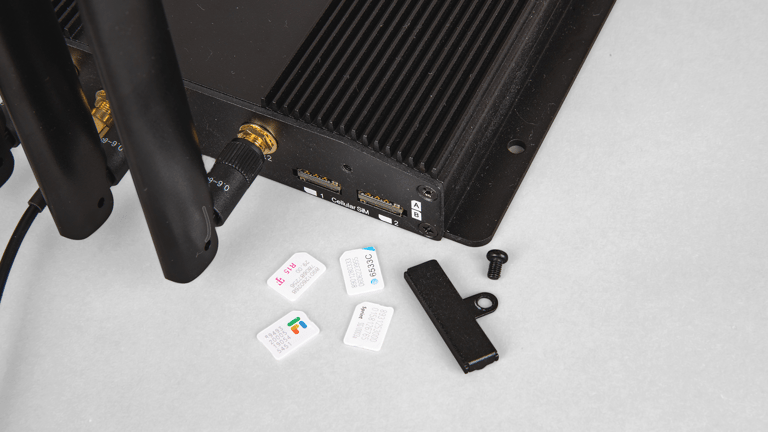A multi-SIM router is a device that has slots for multiple Subscriber Identity Module (SIM) cards and can switch between them or use them simultaneously to provide network connectivity. Some SIM routers [link to new 5G SIM router page] can handle as many as eight SIM cards – and even up to 48 for very specialized use cases – from the same or different providers for bandwidth bonding or for eliminating blind spots or dead zones, which can boost your signal strength and increase Internet performance.

Why should I use a multi-SIM router?
Redundancy, Reliability, and Failover Protection: SIM routers with multiple SIM card slots provide redundancy and increased reliability by automatically switching between SIM cards and networks when a network experiences downtime or poor connectivity. This can be extremely valuable when you’re working in a remote location, or work in a critical field that depends on continuous internet connectivity, like emergency healthcare services.
Load Balancing: By balancing network traffic across multiple SIM cards or networks, multi-SIM routers can increase overall bandwidth, ensuring better performance and connectivity. If you have high data usage requirements or need to support multiple devices, load balancing is key.
Network Coverage: By housing SIM cards from different carriers, a multi-SIM router can leverage a broader coverage area. When one carrier has weak or no coverage in a particular location, another carrier’s SIM card might offer a strong signal.
Flexibility: Multi-SIM routers enable you to easily switch between different carriers or data plans based on your needs or cost considerations. This can be valuable for businesses or individuals who travel frequently or require Internet access in various locations. While 5G SIM routers work with 4G SIM cards, 5G SIM cards [link to new page – Do you need a 5G SIM card for a 5G router] enable 5G routers to capitalize on all the benefits of 5G.
Scalability: If you anticipate expanding your network in the future, a multi-SIM router can offer scalability by accommodating additional SIM cards without the need for significant hardware changes.
VPN and Security Features: Many commercial-grade multi-SIM routers also offer Virtual Private Network (VPN) capabilities for secure connections over public cellular networks.
Cost Savings: Multi-SIM routers can potentially save you money by allowing you to take advantage of different carrier plans, such as one SIM for high-speed data and another for low-cost, backup connectivity. SIM routers can be programmed to use a specific SIM card when it’s cost-effective or when certain conditions are met. For instance, a company might use a local SIM card when operating in a particular region to avoid roaming charges. If the cellular account associated with one installed SIM reaches its data allowance, the device can automatically switch to a second installed SIM associated with a separate data plan to avoid expensive data overages.
Where are some applications for multi-SIM routers?
Conducting Business in Remote Locations: A multi-SIM router can provide consistent connectivity using cellular network via SIM cards in areas where wired Internet is not available or is unreliable.

Conferences and Events: Temporary setups like festivals and conferences may deploy multi-SIM routers to handle high demand and ensure robust connectivity.
Emergency Services: Multi-SIM routers are essential in critical situations where consistent connectivity is mandatory.
Transportation: Buses, trains, cruise ships, and other vehicles can use multi-SIM routers to ensure passengers have consistent connectivity throughout their journey.
What is the difference between a multi-SIM router and a dual-SIM router?
As you’ve probably guessed, a dual-SIM router is a device that supports two SIM cards simultaneously. These routers have two SIM card slots, allowing you to insert two different SIM cards from the same or different cellular carriers.
Dual-SIM routers are often used for basic redundancy and, if the router also has dual cellular modems, load balancing. You can set them up to switch between the two SIM cards based on various criteria such as signal strength, data usage, or failover in case one network becomes unavailable. They are useful for scenarios where you want a backup Internet connection or want to distribute network traffic between two cellular networks.
Multi-SIM routers typically support four or more SIM cards, and are designed for more complex networking scenarios. Like dual-SIM routers, multi-SIM routers are used for redundancy and load balancing, but they usually offer more advanced management and configuration options. They can distribute network traffic across multiple SIM cards or networks for enhanced performance and reliability in remote locations and business environments where high availability and network stability are critical.
What should you consider when selecting a multi-SIM router?
When you’re evaluating SIM routers, it’s important to assess your specific requirements and budget. if you have a stable and reliable Internet connection from a single carrier and redundancy, and load balancing, flexibility, and network coverage aren’t critical for your use case, a single-SIM router may be the right choice for you. If you’re running a business where consistent Internet connectivity is essential, or Internet access simply isn’t available, a multi-SIM 5G router can be invaluable to the success of your business.